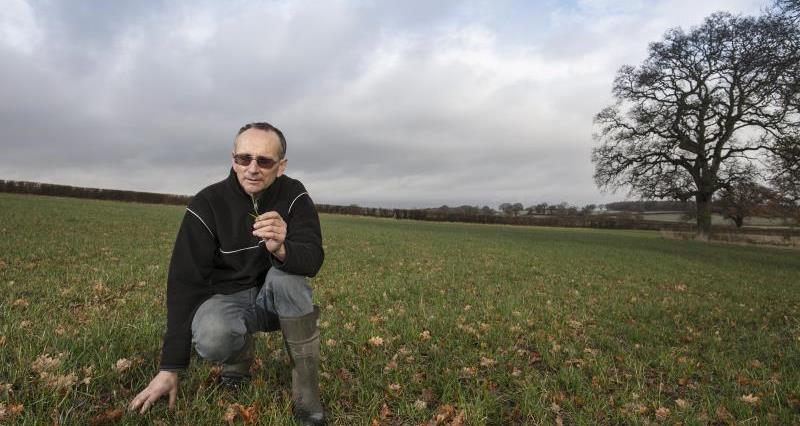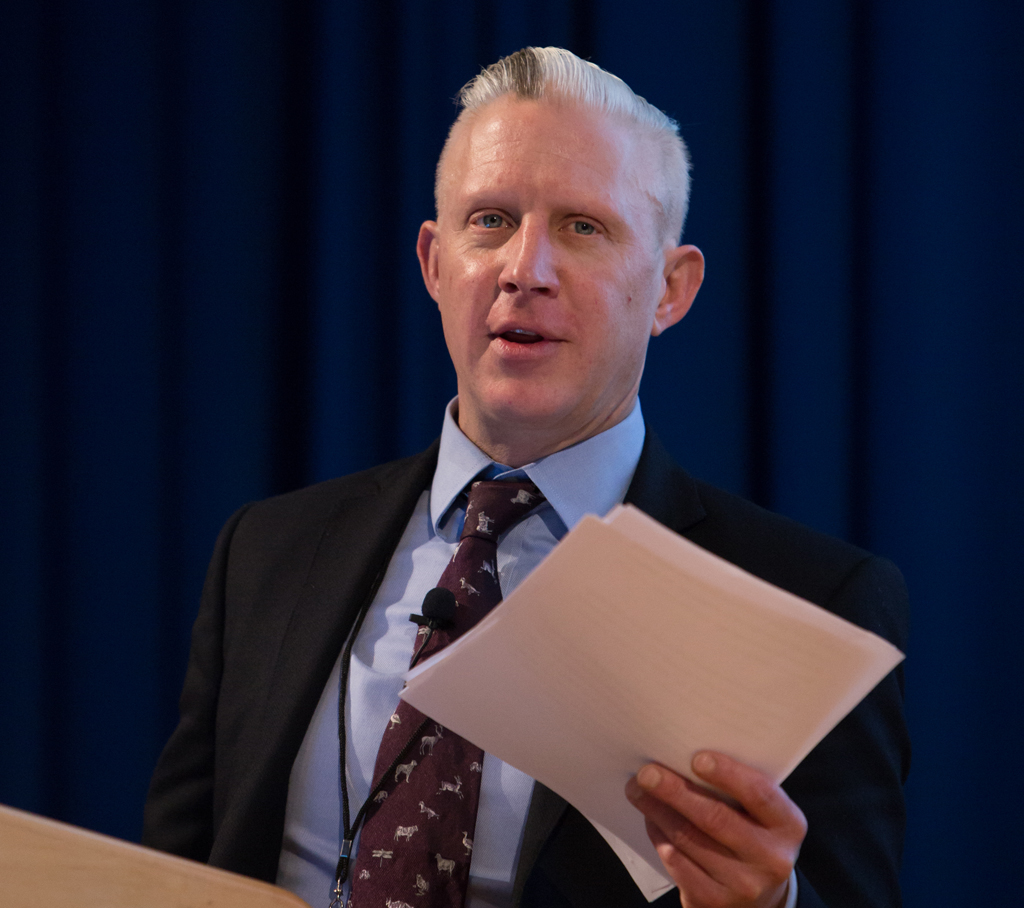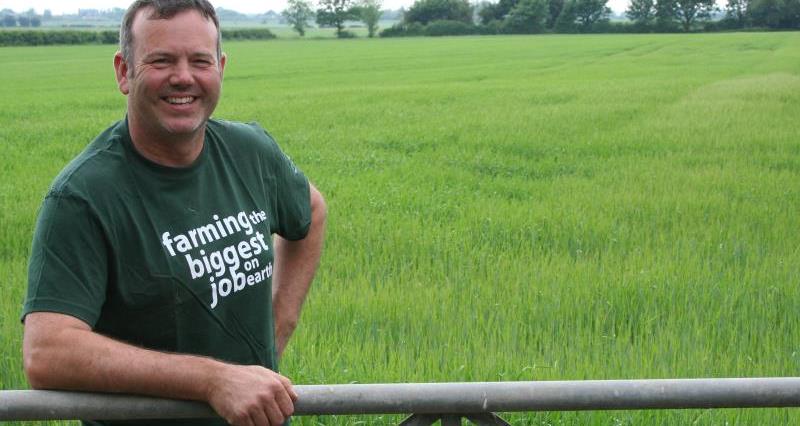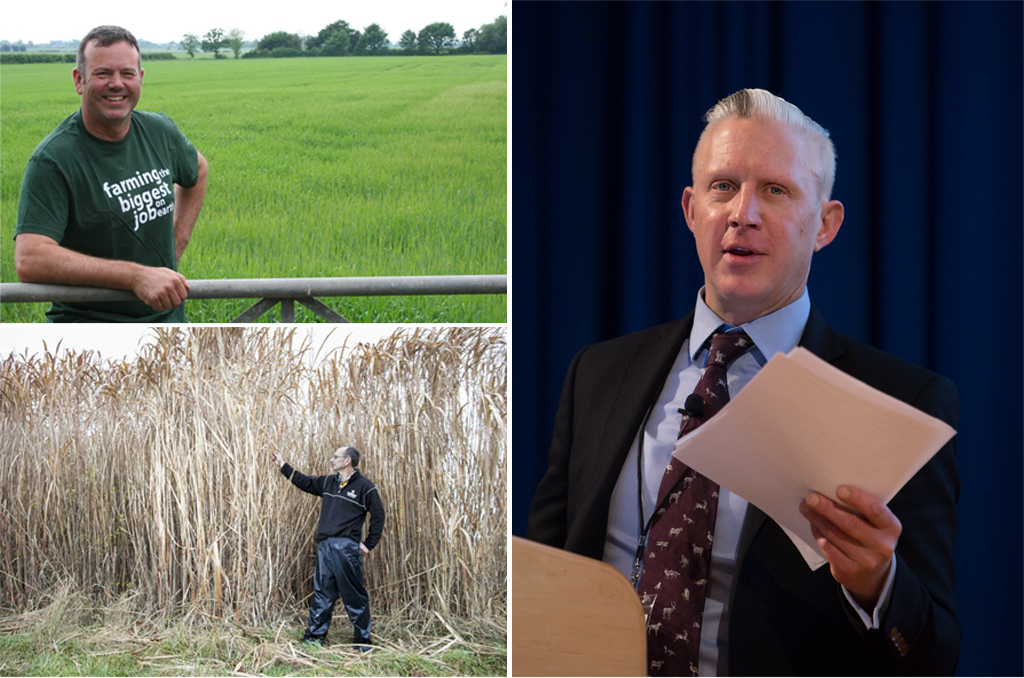The election, coupled with the uncertainty of future trade deals and Brexit, underlines the importance of British farming and food production. Many of the issues they talk about here echo the NFU’s demands for the next government as detailed in the NFU Manifesto. Read the interviews below.
- Mark Pope, NFU Environment Forum chairman
- Jake Fiennes, NFU Environment Forum member
- Richard Bramley, NFU Environment Forum member
Mark Pope, NFU Environment Forum chairman
 Mark farms 700 acres of arable land in the Blackdown AONB, Somerset. The farm includes 48km of field margins providing habitat and food for birds and insects.
Mark farms 700 acres of arable land in the Blackdown AONB, Somerset. The farm includes 48km of field margins providing habitat and food for birds and insects.
What do you want to see from the next government?
I’d like to sees some degree of clarity as to the direction they’re taking and a commitment to promote British agriculture in future trade deals. We also need a firm commitment to roll out an agri-environment scheme that is open to all.
The Countryside Stewardship scheme has been around for two or three years now but it’s become so complicated and time consuming that there is little incentive [for farmers] to persevere with it. We need the next government to roll out a workable scheme otherwise we could see some of the great improvements that have already been made to the environment lost.
If that doesn’t happen, what will that mean for you and your business?
If we don’t have a government that promotes the benefits of our food processing industry then of course that will have a huge impact on our business. Our industry is worth a huge amount to the British economy and the concern is that if we get the hard Brexit free market situation, food might be coming in at a lower standard from abroad where it can be produced a lot cheaper with possibly not the same consideration for the environment or animal welfare.
The government needs to look beyond initial price. They get a lot more for their money from British produce. If it all comes down to price then the environment in this country and other countries around the world will suffer.
What’s your approach to the situation at the moment? For example, are you investing in the business as normal?
At home we are not currently planning any large scale investment until we know more about Britain after Brexit and the trade deal.
Jake Fiennes, NFU Environment Forum member

Jake manages the 5,500 acre Raveningham Estate in South Norfolk. The estate includes 500 acres of mixed woodland, a herd of Sussex beef sucklers and a flock of Norfolk Horn/Romney sheep. It also supports a range of habitats, flora and fauna. It has 170 acres of grass margins, 120 acres of wet grasslands, traditional hay meadows and over 200 miles of hedgerows.
What do you want to see from the next government?
A primary goal for me would be for the government to be more engaged with the importance of food production in the UK and to help us rectify the situation where the public in general have a limited understanding of food production.
Most people are still somewhat removed from the understanding that farmers produce the products they buy in the supermarkets. And that the reason they can still buy a loaf of bread for 50p is because farmers receive support. And that when they can’t get hold of an iceberg lettuce in January, that’s an indication of how fragile the food supply chain is.
During the war, urbanites came out to farm the countryside because everyone knew how important it was. Now there’s complacency because people are so used to being able to buy whatever they need whenever they want it, because asparagus, for example, might be coming all the way from Peru.
We need to get away from the perception that the money farmers receive is free money. Farmers are delivering a valuable land management service for the benefit of the environment. And it’s farmers who are best placed to provide that service with skill, expertise and know-how.
Agri-environment schemes / integrated farming
I’ve been in all of these schemes over the past 25 years. And over that time there have been schemes that have been workable. But it’s the chaos with the RPA that is putting people off. They don’t have the time for the level of detail and form filling. The system needs to be simplified and easy to access.
But the flipside of that is that farmers need to commit to delivering through these schemes. And that takes effort. It’s not just about compliance, it’s about operating effectively. And, crucially, we need to champion those who are demonstrating excellent land management, producing food as well as environmental benefit, to the public.
Access to seasonal labour
We’ve got to have flexibility when it comes to seasonal and migrant labour. My gut feeling is that it will be a lot easier for the government to keep the status quo. There’s been a lot of hyperbole about a hard Brexit but I think, rationally, Europe needs us as much as we need them.
Sourcing reliable labour is a concern and a priority and not just because of the availability of European workers. I know an arable contractor whose average age of staff is 56. What will he do in 10 years’ time? I need to cut my grass crop for hay to feed my animals, and I need to employ people to remove ragwort. I need a reliable source of labour and unfortunately not everybody wants to do this sort of work. A lot of young people are more interested in working in IT or fashion. For the salad and vegetable farmers, this is a real issue.
Have you experienced rural crime? How much of an election issue is that for you?
Yes, we regularly have issues with fly-tipping and the government still has lots to do in this area. More needs to be done to make fly-tipping socially unacceptable.
No one wants to come into the countryside and see a rubbish tip, and unfortunately the problem seems to have developed into a regular and organised occurrence. One farm had 23 lorry loads of rubbish dumped – a £1,000 fine isn’t going to deter criminals who are operating on that level.
Rubbish dumped on farmer’s property is more of a concern for the farmer than it is a priority for the council. One thing councils could do to help prevent the smaller scale fly tippers would be to have rubbish tips open more realistic hours so that people aren’t tempted to dump stuff in the country.
Education
It’s crucial that we educate children, our future customers, about where their food comes from and how it’s produced. We do a lot of farm visits with schools from across the county and education is another area where as a sector we can offer a lot of value.
The feedback from teachers is really positive – they can link all kinds of subjects to what the children learn on farm, maths, history, even English - as well as opening up the idea of career options. I’m also having conversations with the Department of Health on healthy eating, especially in regard to schools. Unfortunately, this is another discussion that seems to be stalled while we wait for the outcome of the election.
Richard Bramley, NFU Environment Forum member
 Richard’s arable farm produces cereals, sugar beet and potatoes and is located beside the River Ouse to the South of York. Richard has been at the family farm for 25 years.
Richard’s arable farm produces cereals, sugar beet and potatoes and is located beside the River Ouse to the South of York. Richard has been at the family farm for 25 years.
The NFU Manifesto
The whole of the manifesto chimes well with me – our farming and food production are so intrinsically important to the fabric of the nation that a strong farming sector is vital.
We must have full recognition for the work we do in food quality and safety as well as the ancillary work in landscape and environment management. Our ability to invest and grow our businesses in a sustainable manner, utilising all the advancements that science can bring, while not disadvantaging our own production here at home and become more reliant on imports is essential as well as practical.
Our next government and future ones need to address these aims – this is long term and often over looked, but our food and landscape is far too often left unconsidered while the political drive focuses on more ‘popular’ areas like the health service and education – both very important, but food underpins these too!
If these aren’t addressed then we will be letting down future generations and the ‘skills gap’ we see developing in farming will only worsen.
From my farming world I face all these challenges but on a micro-scale. Food from my farm produces enough calories to sustain 12,000 people for a year and it underpins a retail value of over £25m of product. A third of my farm has become very vulnerable to flooding since this century began – we cannot afford to see such good land go derelict. Climate change and its challenges cannot be overlooked.
For the moment I carry on, wary of what is round the corner. I have a good business, but it balances on an edge.
On Brexit
I see Brexit as a tremendous opportunity to do well what the EU has failed to achieve – improve food security, allow the market to function properly and reward quality products from good farmers, farming well with due consideration for the landscape in which they work and the long term health of that most vital renewable resource, namely the soil. Economics, tech and science are central to this.
Will this happen? I have very grave concerns that the political ability, intellect, foresight and above all will, is going to be found sadly lacking as this process unveils. Badly designed trade regulations will also squander our chances. The clock has been ticking a while now, the journey has begun – yet we are so very far from knowing where we will end up. And it’s going to be a bumpy ride.
My dream would be for our European colleagues to cast an eye over the Channel in 10-15 years’ time and murmur quietly to themselves ‘Erm, isn’t that a much better way of doing things? I wish we’d listened’.
